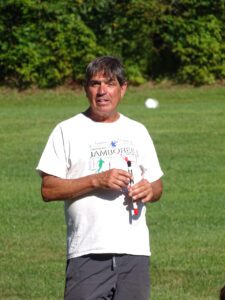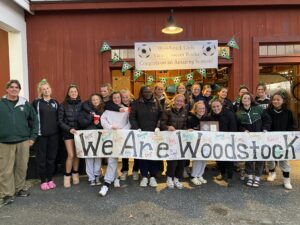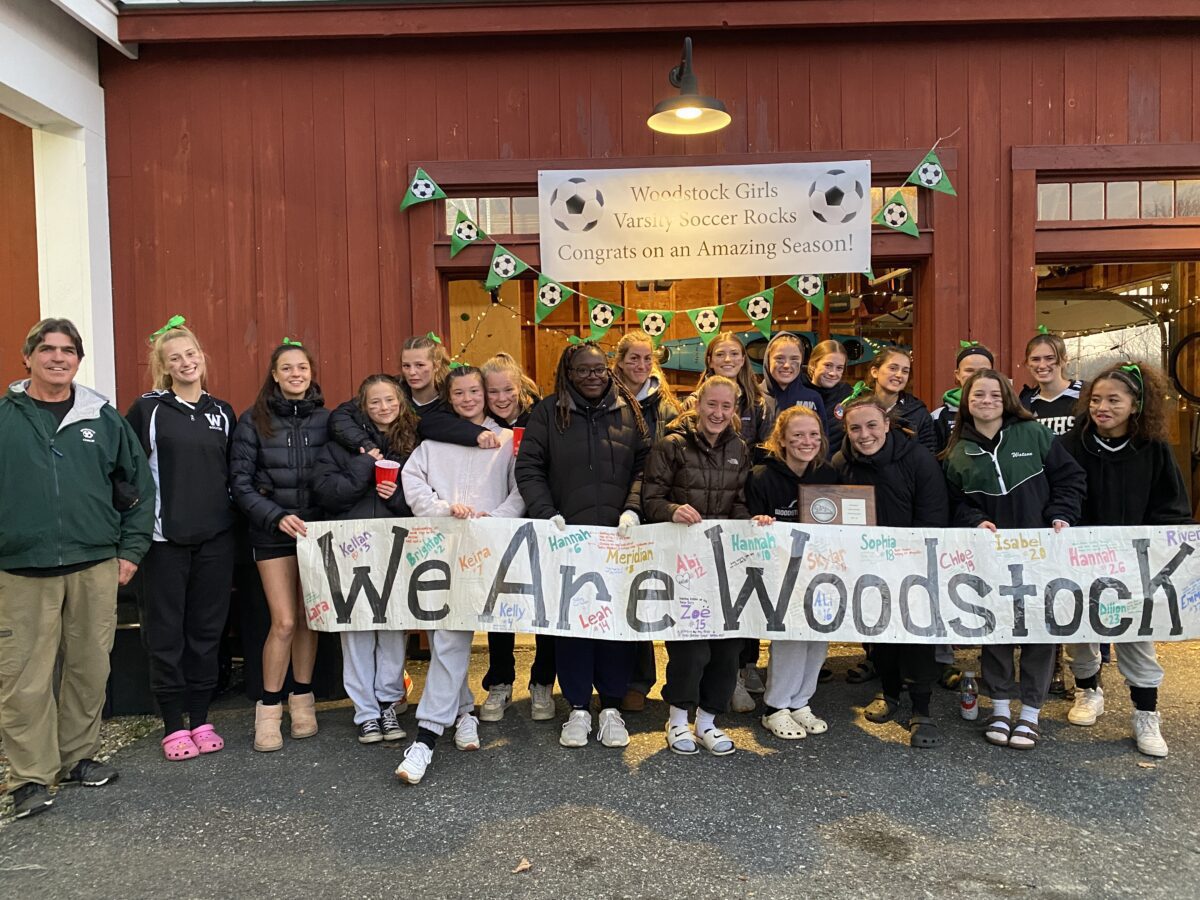‘Hard to leave, but the memories will last a lifetime’
By Robert Shumskis, Standard Correspondent
After 34 years of coaching at various levels of school, 24 of which were spent as Woodstock’s girls soccer coach, Greg LaBella is retiring. As he reflects on the teams he has led, he hopes to leave a legacy of unity and resilience that the next coach can carry into the future.
In the mid-1980s, LaBella was a physical education teacher at several elementary schools. During his weekly travels, he would pass the high school and see the teams practicing. “I said to myself, ‘That looks like fun! I would like to be involved,’” he recalls. He contacted Larry Lattanzi, who was the athletic director, and ended up securing the middle school boys soccer coaching role. He stayed in that position from 1989 to 1999, and along the way he learned that keeping the kids organized was as fundamental as coaching them on their playing.

Coach Greg LaBella is retiring after 24 years at WUHS.
“It was an important part of starting my coaching career at Woodstock, because the programs, both middle school soccer and baseball, had huge numbers, way more than one normal size team,” LaBella says. “Creativity had to become one of the coaching elements used to manage such a large group of players.” He also enjoyed being involved in soccer because it was the one sport he did not play while growing up. “On the job training, stealing ideas from other coaches, taking workshops, and always looking at books with soccer drills was how I built my foundation for coaching soccer,” he details.
Following his first year as the boys soccer coach, an opportunity arose to coach middle school baseball, and he quickly claimed it. During the summer, he coached the Babe Ruth U-14 program. That “was an extra experience for those players more committed to the game and seeking to improve their skills as they looked at playing at the next level,” LaBella says. Soccer offered a similar arrangement, but it could be costly. In an effort to remedy that steep financial commitment, LaBella says, “Billy Langlands, owner of the Darkside Snowboard shop, and I started Darkside Girls Soccer so Woodstock area girls could participate in the spring to get a little bit more soccer in order to advance to the next level.”
The club was open to students from anywhere, but they usually saw players from Woodstock and nearby towns. “We played games on the weekends and practiced after school sports were over because we did not want the players to have to choose between their school sport, usually lacrosse or any other activity, and Darkside soccer,” LaBella says. “This extra exposure to good soccer really made a huge difference in our ability to compete and put a pretty good team on the field, which translated to more successful high school soccer teams. Soccer for our players was now more fun to play, the parents enjoyed better play on the field and the coaches were excited to see their players develop a greater understanding of what made soccer fun to coach.”
In 1999, LaBella recalls that another positive turn presented itself when Carl Hurd offered him the girls varsity soccer coaching position at WUHS, but he was initially hesitant to accept it. “I was not quite sure of myself and that I could effectively take on this new responsibility. My only experience working with girls was in my elementary school gym classes,” LaBella recollects. Hurd told him that he should guide this team “like teaching an elementary PE class, provide lots of encouragement and praise and listen to the words you use to be critical.” After considering it, LaBella stepped into the role.
Aside from Hurd’s words of encouragement, LaBella took the position because it would allow him to coach his own daughter, Kim. “[She] was entering seventh grade, so I would have the opportunity to coach her as she moved through school at Woodstock. I had been coaching my son Ryan in both hockey and soccer, so I felt it was okay switching over,” he says.
Further, he says, “This was a great opportunity to follow through with the girls from my elementary school gym classes. The lessons, mostly about behavior in competition, that I introduced to them in the gym classes in the games we played could be used to help the team better prepare for competition and manage the challenges of competitive athletics. Now they were young women who still loved those games and were able to use the lessons learned.”
As his experience matured, he realized a sort of duality by being serious in his lessons while making sure the players still enjoyed their time. “Keeping the word game ever present in our training became something I utilized all the time; I knew lots of games and always had a car full of gym equipment,” LaBella recalls. “Heck, it was what I knew best, but with the help of great coaching support, I was able to begin to formulate my own vision of the way. One cannot lose sight that we always look to what has been gained in victory and defeat. We must be having fun. It is the reason the players started to play soccer with their friends so many years ago.”
“You cannot change the outcome of the game, but the team can reflect on the process; it is the process that a team attempts to perfect and maintaining composure is what is practiced in the most difficult moments,” LaBella states. “It has been my experience when meeting players from both very successful seasons and very disappointing seasons, that the outcome of the games fade and everything else is remembered in a good way. They never forget the bus ride and all the food we feed them.”

Whether a game ended in victory or defeat, the team always looks to what they’ve learned and the friends they’ve made.
Now that LaBella can fully reflect on his coaching years, he says, “There have been lots of memorable moments, several overtime victories, over 200 wins, but my most satisfying moments have been watching the team celebrate a big victory and when they were able to come together after a crushing defeat. The players being able to enjoy the win and manage those emotions of a disappointing defeat have been the cornerstone of what we coaches hoped to instill in each team.”
However, one particular game does stand above all the others as unique. “It has to be winning the state championship in 2005 with my daughter scoring the winning goal,” he says. “Although our message is that we win as a team and the last play in a game does not win or lose a game, that was a special moment for me as a coach and for our family.”
LaBella admits, “Life after coaching is going to leave a huge void in my daily life. I will miss all the preparation for preseason, the summer games, feeding the players, and being totally consumed in the events of a season, both the good things to reflect upon and the challenges to manage and hopefully make the team’s unity stronger.” Similarly, driving home after a game with thoughts of the key plays and players running through his mind has always been something he has enjoyed.
However, he may not be quite done yet. “I would like to be around to support the next coach, see how the returning players add to our soccer history, and maybe just once in a while feel that I could help a player navigate through a tough situation. Hard to leave, but the memories will last a lifetime for me and hopefully for the players I have been able to coach.”
